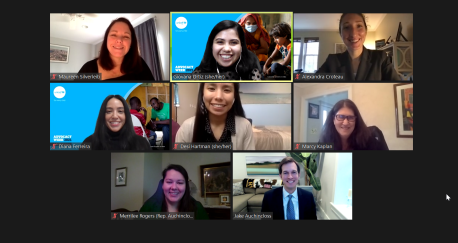
This School Year: Ensure all Children the Right to Go Back to School
More than 25 million children between 6 and 15 years old are missing out on school in conflict zones across 22 countries.The Protecting Girls'Access to Education Act would direct the U.S. Government to increase access to educational, economic, and entrepreneurial opportunities for displaced children, especially girls.
Write Congress
Backpacks filled with school supplies, shiny yellow buses, classmates swapping summer vacation stories –these are the memories that going back to school inspires. Returning to school every fall is a rite of passage for children in the United States. And yet, in many places around the world, children are deprived of this basic right to education.
In fact, 264 million children and youth around the world are currently out of school.
The causes are numerous and interconnected. Gender disparity is one factor; twice as many displaced girls as boys will never start school. Poverty is another cause, as millions of children lack the basic tools we often take for granted in preparing for back to school season, such as pencils and paper.
Arguably the greatest factor is the humanitarian emergencies that have resulted in the largest displacement crisis since World War II. Around the world, nearly 50 million children are living outside of their country of birth or are displaced within their own country.
More than 25 million children between 6 and 15 years old are missing out on school in conflict zones across 22 countries, according to a recent UNICEF analysis. Children need education, especially in emergencies. Yet, refugee children and adolescents are 5 times more likely to be out of school than their non-refugee peers.
As daunting as these statistics may sound, you can contribute to an even more powerful statistic:
In 2016, UNICEF reached 11.7 million children with education in humanitarian situations.
By advocating to your U.S. legislators, you can help multiply UNICEF’s work to ensure that the most vulnerable children, including those in emergency and conflict settings, can access their right to quality education.
The Protecting Girls' Access to Education Act (H.R. 2408/ S. 1580) is federal legislation that encourages the U.S. Government to make the education of children displaced by conflict or crisis a priority in their assistance efforts.
By directing the efforts of the Department of State and the U.S. Agency for International Development (USAID), this bill would increase access to educational, economic, and entrepreneurial opportunities for displaced children, especially girls.
As the children in your life get ready to go back to school, raise your voice to ensure that millions of children around the world have the same opportunity. Be an advocate for UNICEF and write your Members of Congress to help pass the Protecting Girls' Access to Education Act (H.R. 2408/ S.1580).
HOW TO HELP
There are many ways to make a difference
War, famine, poverty, natural disasters — threats to the world's children keep coming. But UNICEF won't stop working to keep children healthy and safe.
UNICEF works in over 190 countries and territories — more places than any other children's organization. UNICEF has the world's largest humanitarian warehouse and, when disaster strikes, can get supplies almost anywhere within 72 hours. Constantly innovating, always advocating for a better world for children, UNICEF works to ensure that every child can grow up healthy, educated, protected and respected.
Would you like to help give all children the opportunity to reach their full potential? There are many ways to get involved.





